I wrote this article in Japanese and translated it into English using ChatGPT. I also used ChatGPT to create the English article title. I did my best to correct any translation mistakes, but please let me know if you find any errors. By the way, I did not use ChatGPT when writing the Japanese article. The entire article was written from scratch by me, Saikawa Goto.
Introduction
Movies and books covered in this article
Three takeaways from this article
- Why did the debate between Mishima Yukio and Tokyo University’s All-Campus Joint Struggle League take place?
- Mishima Yukio had a very gentle demeanor and conducted the debate on his opponent’s terms.
- What did Mishima Yukio really mean when he said he sympathized with the All-Campus Joint Struggle League?
Self-introduction article


Published Kindle books(Free on Kindle Unlimited)
“The genius Einstein: An easy-to-understand book about interesting science advances that is not too simple based on his life and discoveries: Theory of Relativity, Cosmology and Quantum Theory”
“Why is “lack of imagination” called “communication skills”?: Japanese-specific”negative” communication”
The quotes used in this article are based on notes taken at the movie theater from movies in Japanese and are not direct quotes from the foreign language original movies, even if they exist.
The Size of Mishima Yukio’s Vessel was Impressive
My Basic Knowledge and Impressions of Watching the Movie

First, let me write about the basic knowledge I had before watching this movie. I’m writing this to convey that even with such limited knowledge, you can enjoy this movie.
To begin with, I don’t really understand the meaning of terms like “right-wing” and “left-wing”, or “the conservatives” and “the reformers”. In short, I don’t really understand what “right” and “left” mean in the world of politics and so on.

Let me write about the understanding I have based on my vague imagination.

First, “right-wing” gives me an image of a “propaganda truck” and gives me a feeling that they worship “the Emperor”. So it might be something like “patriotism”. And “left-wing” would be probably the opposite, but I am not sure whether it is “against” to what. Maybe it means the opposite of a “patriotic position”. Or maybe “right-wing” and “left-wing” are not completely opposite, but more like a relationship to the extent of “right-wing is not left-wing” and “left-wing is not right-wing”.
I somehow think that “something like the All-Campus Joint Struggle League” is “left-wing”. However, I’m not even sure what “something like the All-Campus Joint Struggle League” refers to. If “right-wing (patriotism)” means “preserving traditional Japan,” then “left-wing” might mean “being open to foreign countries”?

Also, sometimes people explain political positions as like “the Right” or “the Left,” but I don’t really understand what they mean by that too. Based on my vague understanding of the words, “the conservatives” and “right-wing” seem similar, so maybe “the reformers” are “left-wing”?
That’s my understanding of “right-wing” and “left-wing” – in other words, I don’t really understand them at all. So when I read books or watch the news and they start talking about right and left, I suddenly can’t follow what they’re saying.

Such person watched this movie.
And I felt it extremely interesting.
I probably cannot understand the debates in the movie correctly due to my lack of knowledge. The debates were likely conducted under the assumption that everyone had shared prior knowledge, making it difficult for the person with limited knowledge to understand some parts of it.
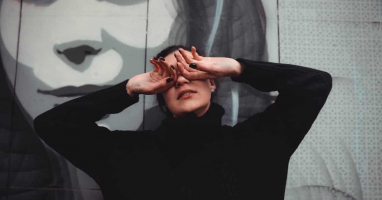

However, in this movie, intellectuals such as Hashidume Daisaburou, Hirano Keiichiro, and Uchida Tatsuru, as well as former members of the “Tatenokai” founded by Mishima Yukio and those who fought in the All-Campus Joint Struggle League, appeared and provided explanations about the debate, so there were some parts where I could understand it to some extent.
In any case, I really enjoyed this movie with my own understanding, and I am generally interested in smart people, so I was excited about the clash of knowledge and ideas.

Background of the Discussion Between Mishima Yukio and Tokyo University’s All-Campus Joint Struggle League
Let’s first look at how this legendary discussion came about. As mentioned earlier, I have no basic knowledge, so I will explain this based on what was explained in the movie. There may be inaccuracies or mistakes, so please bear with me.
The year before the discussion took place, in 1968, was called the “political season”. Various revolutions, such as the “Prague Spring” and “May 68”, were occurring simultaneously around the world. In Japan, the All-Campus Joint Struggle League was at its height, and protests for anti-war and peace, known as GAITOU TOUSOU (struggle in the streets), were happening all over, making Tokyo a state of war between students and riot police. Such days gave the impression that a revolution might occur in Japan too.

In the movie, a former member of “Tatenokai” were asked in an interview if hey had a fear that communist revolution would actually happen, and hey answered “YES.” People who had such awareness must have existed in Tokyo at that time.
“Tatenokai” was a private military organization composed mainly of college students established to respond to such a situation in Japan. They advocated counter-revolution and anti-communism, and trained regularly to be able to take action in case of any situation. “Tatenokai” members were repeatedly involved in trial enlistment with Japan Self-Defense Forces led by Mishima. They felt Mishima’s determination that if they drew their Japanese swords, they could settle any confrontation, even if it was against the All-Campus Joint Struggle League. In the movie, a former member of “Tatenokai” talked, for the reason that it would be already past the statute of limitations, about how they performed live ammunition firing training during Japan Self-Defense Forces training.
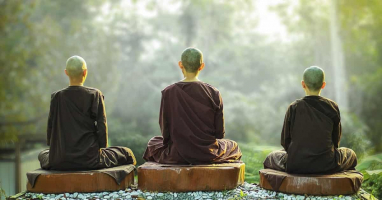
In January 1969, the Yasuda Auditorium Incident occurred. The Tokyo University’s All-Campus Joint Struggle League, which had formed the previous year, had a hardline attitude and was prepared to use violence. However, the Yasuda Auditorium fell due to water cannons and tear gas.
As the next move, the Tokyo University’s All-Campus Joint Struggle League considered a “debate with Mishima Yukio.” They formed the “TOUDAI FUNSHO IINKAI (The University of Tokyo Book Burning Committee)” and began preparing for a debate with Mishima, determined not to let the Yasuda Auditorium Incident become meaningless.

At that time, Mishima began making political statements. Fuethermore, he was also competing with Kawabata Yasunari for the first Nobel Prize in literature awarded to a Japanese writer, and had outstanding worldwide fame. In addition, one of the members had read Mishima’s “文化防衛論(Defense of Culture),” so they decided to bring Mishima into the discussion saying “Let’s argue with us about Japan.”
Thus, a debate with Mishima Yukio was arranged for May 13, 1969. This was a year and a half before Mishima Yukio committed suicide at the Land Self-Defense Force’s Ichigaya garrison. The debate would take place in Classroom 900th of the College of Arts and Sciences at Komaba, which was separate from the campus where Yasuda Auditorium was located, and would involve facing 1,000 members of Tokyo University’s All-Campus Joint Struggle League.
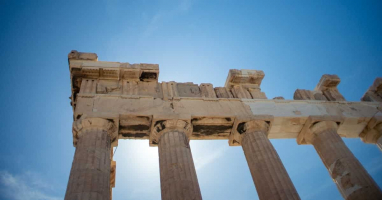
This is the beginning of a legendary debate between Mishima Yukio, a big name in the right-wing conservative movement, and the Tokyo University’s All-Campus Joint Struggle League of 1000 left-wing reformers.

On the poster announcing the debate, the students drew a picture of Mishima Yukio in the likeness of a gorilla, calling him “KINDAI GORILLA” and provoking him with comments like “Feeding cost: 100 yen or more.” There were even rumors that the Tokyo University’s All-Campus Joint Struggle League was boasting that they would “make him commit seppuku on stage,” and members of the “Tatenokai” secretly infiltrated the front row of the audience to observe the situation.
TBS was the only one who recorded this debate on camera. It seems that Tokyo University’s All-Campus Joint Struggle League had some other connection with TBS in a different coverage, and they only reached out to TBS. This movie was made using the valuable footage that only TBS has kept.

Mishima Yukio’s Gentle Demeanor
While it was difficult to fully understand the debate itself, there was something very impressive while watching the movie.
It is that Mishima Yukio had a remarkably gentle demeanor.
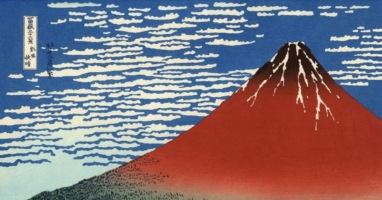
Kimura Osamu, who served as the moderator, reflected on the event and said the following:
He probably thought that people from the All-Campus Joint Struggle League were no good and felt like charging into enemy territory alone.
I can’t feel it myself, but thinking normally, being invited by opponents with completely different ideologies, provoked in a debate labeled “1 vs 1000,” and even called a “gorilla,” I don’t think one would be in a calm state of mind.
However, Mishima showed no sign of such behavior.

Kimura, who was the moderator, saw Mishima calmly discussing the issues with a smile on his face, and at the beginning of the debate, accidentally referred to him as “Mr. Mishima.” Kimura apologized, saying
It’s a bit of a problem that I called you “Mr”.
Looking back on it, he said the following:
He speaks so politely and never speaks rudely, which was surprising. That’s why I unintentionally called him “Mr.”.

Uchida Tatsuru also commented on the debate, saying:
Mishima is sincere and trying to convince 1,000 people. He never tries to embarrass his opponents or point out logical contradictions.
And that’s exactly right.

Mishima is determined to understand and persuade his opponents in the debate. It comes across very clearly. Mishima Yukio, tremendous genius, could have used dazzling arguments to confuse the debate and turn it into an incomprehensible match where it was difficult to tell who won or lost, even against a University of Tokyo student. I think it would have been safer to take that approach. However, Mishima did not do that. He faces the debate head-on and with honesty.

On stage, the person who confronts Mishima the longest is a man named Akuta Masahiko, who debates while holding a child. There were many parts of the debate between Mishima and Akuta that were too advanced for me to understand, but even when Akuta sharply criticized Mishima, Mishima never lost his smile. On the other hand, Akuta was also very impressive with his calm demeanor, which contradicted the expectations of those who had imagined a tense confrontation, such as lighting Mishima’s cigarette for him.

Mishima Yukio Argued on the Opponent’s Basis, While Tokyo University’s All-Campus Joint Struggle League Insist on Their Own Opinions
One noteworthy aspect that left an impression, aside from the content of the discussion itself, was the difference in the approach to the debate.
It was clear that Mishima Yukio had the intention of “fully discussing on Tokyo University’s All-Campus Joint Struggle League’s basis.”

For example, although I didn’t understand the discussion itself, there was an exchange about “liberated area.” Mishima Yukio first mentioned the definition of “liberated area,” and then asked Akuta if the definition was correct. After confirming, they continued to deepen the discussion.
In other themes as well, Mishima always maintains this attitude. I felt a great intelligence in the way he accurately recognizes the words and values of the other party in the discussion, and develops the discussion based on that foundation.
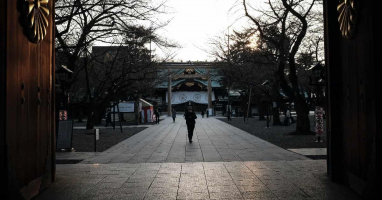
On the other hand, I felt that on the side of Tokyo University’s All-Campus Joint Struggle League, not only Akuta, who developed a particularly difficult argument, but also everyone else remained just to making their own arguments in their own words.
Of course, it is unlikely that all of the actual debates were included in this film, and there may have been scenes of the Tokyo University’s All-Campus Joint Struggle League debating on Mishima Yukio’s basis. However, at least as far as this movie goes, I felt that the Tokyo University’s All-Campus Joint Struggle League did not leave their own basis until the end.
While Mishima clearly demonstrated his willingness to come down from his own basis and fight on his opponent’s basis, the Tokyo University’s All-Campus Joint Struggle League seemed to be struggling to figure out how to get Mishima to their basis. Therefore, even though it has nothing to do with the content of the debates, I felt that Mishima had already won this point.

Hirano Keiichiro explained why Mishima Yukio accepted this debate in the first place as follows:
Does language serve its actual function? Can his words be understood by those who hold the opposite position? I think Mishima was interested in these points and therefore participated in this debate.
With this stance in mind, you can deepen your understanding of the words spoken by Mishima.

Now, University of Tokyo students tend to use difficult words and logic, making it difficult for me to understand their arguments.

However, even if Mishima used difficult words, his arguments were relatively easy to understand. This is probably because he writes novels for the general public. If he, who regularly communicates with readers using words that “get through,” is likely to have approached this debate with an experimental spirit which wondering “whether his words could reach even those who hold completely opposing beliefs,” it should come as no surprise that his argument is easy to understand.

Incidentally, an audience member who is also a University of Tokyo student, during a discussion, heckled, “I came here because I heard there was a meeting to punch Mishima, but all I hear is abstract arguments,” and there was even a scene where University of Tokyo students were arguing with each other. Even for University of Tokyo students, it may have been difficult to understand. Mishima seemed to find it amusing to watch University of Tokyo students arguing with each other.
Mishima Yukio Showing Empathy for Tokyo University’s All-Campus Joint Struggle League
As for the way he conducted the debate, what impressed me was that Mishima Yukio frequently showed sympathy for the Tokyo University’s All-Campus Joint Struggle League.
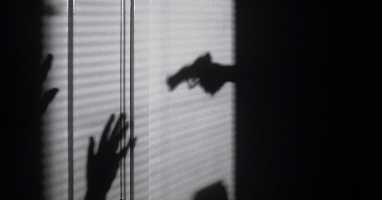
The easiest to understand might be the talk about “approving illegal violence.” Mishima said this:
If I were to take action, I would have to do it illegally. If I were to do it with the idea of a one-on-one duel, it would be tantamount to becoming a murderer, so I am thinking of committing suicide or something before being caught by the police.
Considering that this was a statement made a year and a half before his suicide, it can be seen as intriguing.

Mishima sympathizes with Tokyo University’s All-Campus Joint Struggle League that although his beliefs differ from those of them, he can understand what you are doing as a means to an end. When we think of discussions, we tend to imagine “opposition,” but discussions with opponents who have no common ground to start with cannot even take place. I think Mishima was someone who understood this theoretically or intuitively. In short, this can also be seen as part of an experiment to see if his words can reach someone with an opposing view.
In addition, he said, “I dislike a world where intelligent people are in charge and decide and move various things,” and acknowledged, “I recognize that you have surprised the intellectuals with your actions.” Again, this is an expression of sympathy for their actions, even though their beliefs differ.

Furthermore, Mishima made an astonishing statement:
I don’t mean to exaggerate, but if you just said “the Emperor,” I would have happily joined you in the standoff.
He even talked about being able to fight alongside them.

“Right-wing vs. Left-wing” is Not the Essence of the Debate
Following a series of discussions leading up to this point, Uchida Tatsuru identifies the essence of this debate.
Mishima understood that the difference in stance between himself and the Tokyo University’s All-Campus Joint Struggle League was not rooted in the right-wing vs. left-wing conflict. Being an intuitive person, he realized that the essence of the debate was the anti-American and patriotic movement. That is why Mishima claimed that he could collaborate with the All-Campus Joint Struggle League.

Akuta was also asked by the interviewer, “If you had to name a common enemy of Mishima Yukio and Tokyo University’s All-Campus Joint Struggle League, what would it be?” He answered as follows:
A vague and vulgar country called “Japan.”
While Tokyo University’s All-Campus Joint Struggle League intended to pull in Mishima Yukio, a “right-wing figure,” and create a sense of presence as a “left-wing” group by making their claims in opposition, Mishima himself did not believe that such a conflict existed in the first place. I found this to be a very interesting observation.

In the first place, Mishima Yukio, who was originally a “right-wing” heavyweight, had ambiguous feelings towards “the Emperor”. According to Hirano Keiichiro, he held critical views of Emperor Showa as an individual while also having positive feelings towards his personal connection.


During a discussion, he also talked about that personal involvement. When he graduated from Gakushuin Boys’ Senior High School as the top student, he received a silver watch from the Emperor, however, it seems that what left a strong impression on him was the sight of the Emperor standing still for three hours during the graduation ceremony. It is said that this story has been shared by Mishima Yukio on various occasions.
Despite being “right-wing,” Mishima Yukio had complex feelings towards “the Emperor,” and multiple people have mentioned that he used the term with his own connotations. Akuta described it as the “absolute authority,” Uchida Tatsuru described it as the “source of unconscious energy,” and former members of the “Tatenokai” described it as “the concentrated presence of Japanese culture and traditions.” Regardless, it seems that Mishima did not use the term “the Emperor” to refer to a specific individual.

A Sense of Loss that the “Individual” has been Established
In the midst of the discussion about “the Emperor,” Mishima Yukio spoke as follows:
I find beauty in unifying myself with “the Emperor.”
It can be inferred that being an “individual” was not important for Mishima.

Uchida Tatsuru pointed out that people like Mishima Yukio, who survived in the environment of the end of the war during their teens, have a special sense. Those born in the 1930s were prepared to die in the war, which means that “national destiny and personal fate were intertwined.” However, when the war ended, personal fate lost its connection to national destiny.
It was suggested that they continued to live in the post-war era while carrying this sense of loss.

Akuta asked Mishima, who said “I find beauty in unifying myself with ‘the Emperor’,” “If so, you won’t be able to exceed the limits of being Japanese.” To which Mishima replied, “That’s fine. I don’t think I want to exceed the limits of being Japanese.” It’s unclear what “the limits of being Japanese” refers to, but it can be said that Mishima had a very weak consciousness of himself as an individual.
Honestly, I don’t know why Mishima Yukio committed seppuku, but perhaps it was to encourage others with “Rise up for the sake of the country.” In that case, it could be said that the weak consciousness of “Mishima Yukio as an individual” led to seppuku.

Conclusion
At the end of the movie, the interviewer asks the All-Campus Joint Struggle League generation how they reflect on their experiences during that time. The most memorable response came from Akuta. When asked by the interviewer if the All-Campus Joint Struggle League generation was considered to have lost, Akuta answered in this way:
I don’t think we lost. Maybe that’s how it’s defined in your country. But I’m not there. In my world, we didn’t lose.


Although it may sound like sour grapes just from reading the words, Akuta on the other side of the screen did not give off any vibes of being making excuses for losing. I’m not sure which side won or lost, but either way, I envy the ability to have such a strong will and conviction.

There is opposition in any world, not limited to right-wing or left-wing, and society seems to be becoming even more intolerant. Debates and discussions in such a world are felt by me to be a ruthless and unsympathetic affair without acceptance or empathy.
The content of the debates presented in this movie may be outdated. However, I felt that “shared premises” and “attitude of empathy” demonstrated by Mishima Yukio are an extremely admirable stance for calming down opposition, and feeling so can be considered one of the great utilities of watching this movie.

Published Kindle books(Free on Kindle Unlimited)
“The genius Einstein: An easy-to-understand book about interesting science advances that is not too simple based on his life and discoveries: Theory of Relativity, Cosmology and Quantum Theory”
“Why is “lack of imagination” called “communication skills”?: Japanese-specific”negative” communication”







コメント